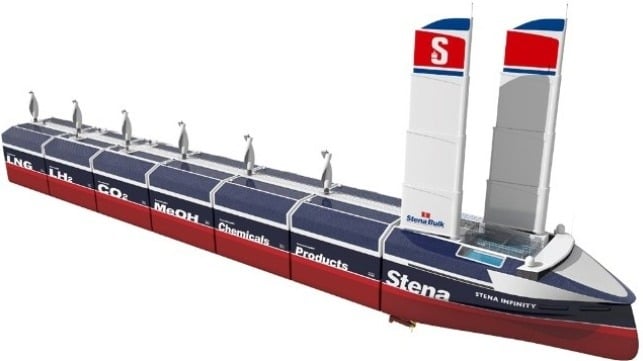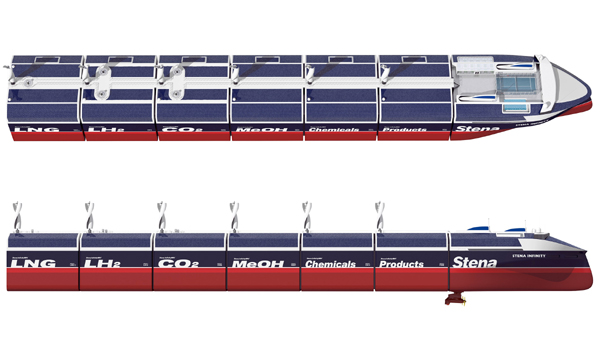Stena Bulk Unveils Modular, Hybrid Design to Meet Future Needs

Challenging conventional thinking in ship design, Stena Bulk unveiled what it is calling a unique new concept designed not only to meet the needs of sustainable, carbon-free shipping but also to advance the handling of wet and dry bulk, improve port operations and incorporate the latest technologies including semi-autonomous shipping. The InfinityMAX concept, which is designed to carry both dry and wet cargoes in modular compartments, incorporates several new core principles that the company believes represent a paradigm shift in cargo transportation.
Designed to create increased flexibility in response to the challenges that the global shipping industry will face in the future, the concept is designed to transport dry bulk, liquid bulk, or liquified gas products, such as methane, hydrogen, or ammonia. By 2050, Stena Bulk believes shipping will be challenged by the need to transport energy from areas with abundant renewable supply to areas with large energy demand. They envision the traditional bulk category will need to expand to carry hydrogen, methanol, methane, and ammonia as well as sustainable, edible oils and chemicals, and carbon dioxide from carbon capture facilities.
In addition to combining multiples types of cargo, efficiency would be improved through the use of standardized and modular cargo units that would streamline the loading and transportation of wet and dry bulk cargoes. Stena Bulk compares the modular cargo units to containers that revolutionized the intermodal freight trade.

“What we are proposing here is innovative, provocative, and would radically reshape the way we think about bulk trade, rationalizing two segments with complimentary expertise into one shipping segment that is ready for the challenges of the future,” said Erik Hånell, President & CEO, Stena Bulk. “The application of advanced technologies, including hydrogen fuel and other efficiency measures, means that this is a vessel concept that proves our core philosophy that innovation is key to commercial success, given the challenges that we all face.”
The InfinityMAX concept drives improved world fleet utilization and the potential for more standardized supply chains. The modular cargo containers would also reduce the unnecessary environmental impact of empty tanks being shipped around the world in search of new cargo.
The modular units have also been designed to be able to be dropped off outside of ports and picked up by tugs, avoiding congestion and reducing call times dramatically. Each of the InfinityMAX’s cargo units is also designed to be self-sufficient in terms of their energy use, with wind turbines and solar panels generating all the electricity needed for internal systems.

that matters most
Get the latest maritime news delivered to your inbox daily.
The InfinityMAX concept would use hydrogen as a marine fuel and wind turbines to generate further energy. Collapsible wing sails and a sharkskin hull have also been incorporated in the concept design to significantly improve efficiency.
Although the vessels will be crewed for safety and flexibility reasons, Stena Bulk has designed the InfinityMAX concept to be semi-autonomous to meet the future demand of efficient operations without compromising safety. InfinityMAX would also improve crew wellbeing on board, for a sustainable working environment. As a result, InfinityMAX has the potential to change the role of onboard crew, with less hard labor and more focus on monitoring and interaction with operators ashore.
With the right level of matured technologies, Stena Bulk believes that an InfinityMAX vessel could come into service between 2030 and 2035.
